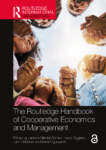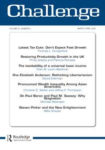When is a “Coop” not really a cooperative? The short answer is whenever the actual activity of the “cooperative” is not carried out by the members but by employees. The problem is, of course, not in cooperation per se but in the hiring, employing, renting, or leasing of people to carry out the supposedly “cooperative” activities of the “cooperative.”
Are Marginal Products Created ex Nihilo?
This is Chapter 5 from my book: Ellerman, David. 1995. Intellectual Trespassing as a Way of Life: Essays in Philosophy, Economics, and Mathematics. Lanham MD: Rowman & Littlefield.
When an orthodox economist considers the principle of people getting the fruits of labor, he or she will invariably interpret it in terms of marginal productivity. The orthodox claim is that under the conditions of competitive equilibrium, each unit of labor “gets what it produces.” Well-meaning capitalist liberals emphasize that actual capitalism may be neither competitive nor in equilibrium, and in any case, there are enormous difficulties in measuring the “marginal product of each factor of production.” In other words, they accept that interpretation of marginal productivity theory in principle but fuss about its applicability in practice.
Myth and Metaphor in Orthodox Economics
This is Chapter 2 from: Ellerman, David. 1995. Intellectual Trespassing as a Way of Life: Essays in Philosophy, Economics, and Mathematics. Lanham MD: Rowman & Littlefield.
Discussion of the fundamental questions of political economy is today almost completely clouded and distorted by a number of basic myths and metaphors. Deconstruction is necessary before constructive discussions can begin. The myths and metaphors are concerned with basic conceptions about property and contract, not with prices and markets. As layer upon layer of distortions are removed, new facts and new perspectives on old facts will emerge. These facts have fairly direct normative implications, but the disagreements and controversies are about the facts, not about norms or prescriptions.
Trespassing against the Happy Consciousness of Orthodox Economics
This is Chapter 1 in my book: Ellerman, David. 1995. Intellectual Trespassing as a Way of Life: Essays in Philosophy, Economics, and Mathematics. Lanham MD: Rowman & Littlefield.
This first chapter addresses the problems of trespassing involved in understanding the arguments presented in the first five “controversial” chapters of the collection. These chapters challenge the whole idea of the employer-employee relationship that is the institutional basis for our present version of a private-property market economy. The problems of trespassing against fundamental orthodoxy in the social and moral sciences are of a completely different order of magnitude than the problems of trespassing in the natural and mathematical sciences.
Lavoie Referee Report on “Property & Contract”
Edit This is Don Lavoie’s letter giving his referee report on my Property & Contract book which was published by Basil Blackwell in 1992. Don Lavoie (1951-2001) was a neo-Austrian economics professor at George Mason University. He developed a hermeneutical approach to economics. Click here to download the letter.
Lord Eustace Percy’s “Unknown State” Lecture
Lord Eustace Percy was a Conservative public servant but was better known as a serious thinker, indeed, as the “Minister of Thinking.” There is a remarkable and much-quoted passage in his 1944 Riddell Lecture The Unknown State.
A Theory of Inalienability: Towards a Theory of Classical Liberal Jurisprudence
This is a draft paper that presents some of the arguments I have been making for years in a framework analogous to Type I and Type II error in statistics–which seems to clarify the arguments. Historically, the sophisticated arguments for slavery and autocratic government were consent-based in terms of implicit or explicit contracts. And the legalized oppression of married women was based on the coverture marriage contract. Hence the critiques developed in the abolitionist, democratic, and feminist movements were not simply arguments for consent as opposed to coercion, but arguments against certain voluntary contracts, e.g., in the form of inalienable rights arguments.
Talk: Neo-abolitionism and Marxism
These are the slides for a talk given in Munich in November 2017 at a conference on the Russian Revolution. The basic argument is that much of what John Stuart Mill said in the middle of the 19th century still sounds radical today. The reason is that Marx, Lenin, and the Russian Revolution set back the Left for a century and a half.
Talk: A Tale of Two Invalid Contracts: Coverture and Employment
These are the slides for a talk that focuses on the parallel inalienable rights arguments against the now-outlawed coverture marriage contract and the yet-to-be-outlawed employment contract.
Review-Essay on Elizabeth Anderson’s “Private Government” book
In her recent book Private Government [2017], Elizabeth Anderson makes a powerful but pragmatic case against the abuses experienced by employees in conventional corporations. The purpose of this review-essay is to contrast Anderson’s pragmatic critique of many abuses in the employment relation with a principled critique of the employment relationship itself.




